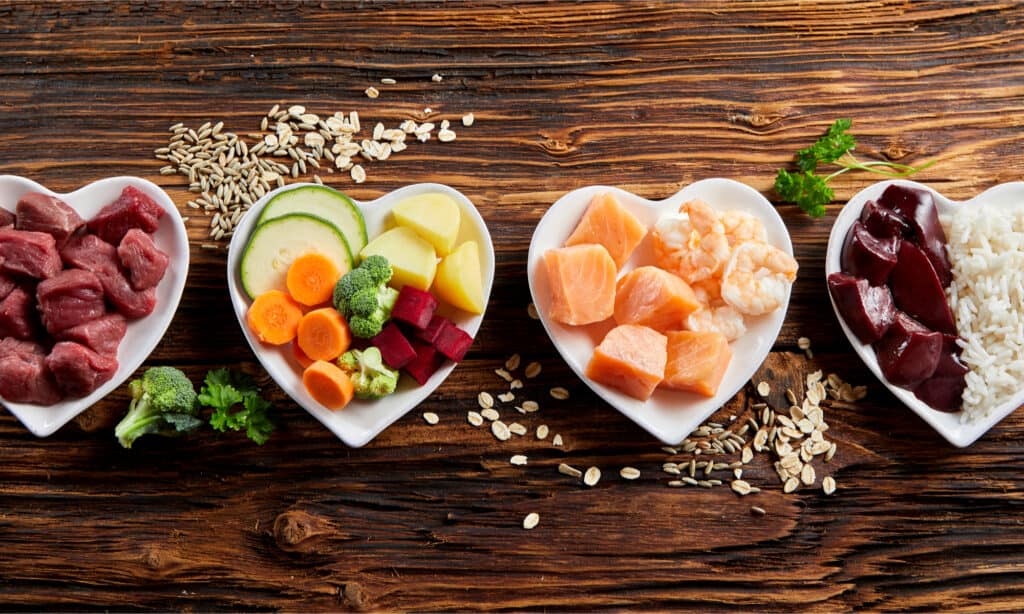Kiwis are a popular fruit for drinks. You might have tried a strawberry kiwi smoothie once or twice. While this fruit complements a lot of beverages and snacks, you may be wondering if your doggie can have a few bites with you. Kiwis are safe for dogs and offer quite a few benefits.
They are 80 percent water which can help on hot days when your pup still needs a daily walk. Besides hydration, what other benefits do they offer dogs? Are there any risks to feeding kiwis to dogs? In this post, we’ll cover how to feed your dog and what the risks may be. Grab a kiwi and get ready to share some with your dog after this post in three two one go!

Kiwis are 80 percent water which can help on hot days when your pup still needs a daily walk.
©iStock.com/IuriiSokolov
Benefits of Feeding Your Pup Kiwi
Kiwis have several benefits for dogs, like fiber and calcium. Like humans, fiber is great for a dog’s digestive system. The helpful bacteria in your doggies colon frequently digest fiber into fatty acids. Thus, the colon can heal from injuries thanks to this fatty acid, which also aids in preventing the proliferation of any harmful bacteria. Let’s see more about what kiwis can offer dogs.
Lutein
Lutein is a type of vitamin essential for the health of dog eyes. It is present in the lens and retina of dogs. This vitamin’s main job is to soak up the blue light that comes into the eye. The lens and retina may be harmed by light-related damage if too much blue light isn’t absorbed. Due to its antioxidant properties, lutein can help prevent or postpone the damage that free radicals cause to cells. Free radicals are the body’s naturally occurring, damaging substances.
Vitamin C
Dogs can make vitamin C with the aid of their liver, yet in some circumstances taking a supplement can have several health advantages. Proponents argue that while a vitamin C supplement is usually not required for healthy dogs, it can be beneficial for animals who are ill or under stress. Dogs that hunt, herd, or track may benefit from an additional vitamin C boost in their diet since physical stress, in particular, can decrease your dog’s levels of vitamin C.
Calcium
Like humans, dogs require calcium for all of their bodily functions. Because calcium is involved in numerous feedback loops and hormone signaling pathways in the body, elevated calcium levels can easily cause other issues. Pregnant or nursing dogs consume large amounts of calcium to support developing fetuses and produce enough milk to feed the litter.
Potassium
One of the most crucial minerals for a living thing’s proper operation is potassium. Because of this mineral’s high level of water reactivity, it is actually referred to as an electrolyte. This indicates that this mineral produces positively charged ions, enabling it to conduct electricity when it dissolves in water. Potassium is essential for controlling fluid, triggering muscle contractions, and transmitting nerve messages.

Kiwis have several benefits for dogs, like fiber and calcium. Like
humans
, fiber is great for a dog’s digestive system.
©stockcreations/Shutterstock.com
What Are the Risks of Dogs Eating Kiwi
Kiwis are a harmless dog treat, but the skin and seeds can be harmful if consumed in large quantities. Before providing kiwi to a dog, people should remove the seeds because they carry toxins when consumed in large quantities. Dogs can’t digest kiwi peel adequately due to their digestive systems. Although the tough skin is probably not harmful, small dogs may choke on it, and it may also obstruct the digestive tract if taken whole.
Larger Dogs also find it difficult to digest the rough skin, which frequently results in digestive problems. If the kiwi has been chopped too large, your dog could choke on it too, which is an issue when feeding it to them. Cut food into small pieces and provide it to your dog slowly so they have time to chew to help prevent choking. Kiwi eating in excess might upset the stomach. If your doggie shows any of these signs, avoid giving them kiwis:
- Vomiting\Diarrhea
- Having no appetite
- Tummy that hurts or is swollen
- Lethargic

Larger Dogs also find it difficult to digest the rough skin, which frequently results in digestive problems.
©Roger costa morera/Shutterstock.com
How to Feed Kiwi to Dogs
Start giving your dog kiwi in tiny amounts to give them time to adjust to the new nutrients and components healthily. Abrupt changes to their typical diet might harm a dog’s digestive system. Kiwi seeds and skin can be poisonous to dogs if they eat them in excessive quantities, even though the juicy fruit of the kiwi is edible.
Keep an eye out for allergic reactions in your dog. After you give a new food to your pet, look for indications of food allergies. Allergies frequently cause stomach problems or breathing issues as adverse effects. Watch your pup for signs of diarrhea or constipation.
Adverse gastrointestinal reactions to food or a treat might include nausea, vomiting, and diarrhea as symptoms. It’s common for these symptoms to go away on their own within a few hours, but if they continue for more than one or two days, you should seek immediate assistance from a veterinarian.

Start giving your dog kiwi in tiny amounts to give them time to adjust to the new nutrients and components healthily.
©Prostock-studio/Shutterstock.com
How Much to Feed Dogs
Never give your dog the whole kiwi because it might cause choking, especially if they are the type to inhale their food. If you can’t be sure your dog will chew everything thoroughly, it’s preferable to break food into smaller pieces because it’s always better to be safe than sorry.
The choking risk is eliminated by cutting up a kiwi, keeping your dog perfectly safe. A toy poodle, for example, is too little to consume a whole kiwi fruit, and eating that much fruit could make them sick. A large dog could easily consume an entire kiwi in bits.
The 10% rule should always be followed when determining how much kiwi to feed your dog. Kiwis are a treat even though they are a natural and healthful food. No treat should account for more than 10% of your dog’s daily calorie allowance, including fruits and vegetables.

The 10% rule should always be followed when determining how much kiwi to feed your dog. Kiwis are a treat even though they are a natural and healthful food.
©ThamKC/Shutterstock.com
Conclusion
Kiwis can be a fantastic addition to your dog’s diet vitamin-rich kiwi. Vitamin C, calcium, potassium, and fiber are all abundant in kiwis. They are also rich in beta carotene and lutein, nutrients that support healthy eyes (which act as antioxidants).
This indicates that the extra vitamins and minerals of kiwis may benefit your dog’s general well-being. While you shouldn’t only feed them kiwis, they make a fun snack, especially in the summer! Just be sure they have great doggie food as well.
So share some with your pup; they are sure to love you for it. Send this post to other pet owners who like to eat kiwi and would love to share some with their pups. Our other post below can help you learn what else is safe for dogs to eat!
Up Next:
- Can Dogs Eat Pomegranate Safely?
- Can Dogs Eat Figs? Do’s and Dont’s
- Can Dogs Eat Strawberries, Are They Safe or Dangerous?
The photo featured at the top of this post is © Ezzolo/Shutterstock.com
Ready to discover the top 10 cutest dog breeds in the entire world?
How about the fastest dogs, the largest dogs and those that are -- quite frankly -- just the kindest dogs on the planet? Each day, AZ Animals sends out lists just like this to our thousands of email subscribers. And the best part? It's FREE. Join today by entering your email below.
Sources
- The Dodo / Danielle Esposito / Published May 13, 2022 / Accessed September 22, 2022
- Smart Dog Owners / Jackob Evans / Published March 8, 2021 / Accessed September 22, 2022
- Can Dogs Eat It / Accessed September 22, 2022
- Popular Doodle / Accessed September 22, 2022
Thank you for reading! Have some feedback for us? Contact the AZ Animals editorial team.







